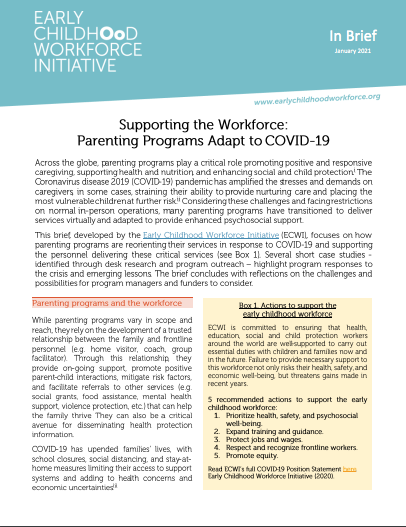Supporting the Workforce: Parenting Programs Adapt to COVID-19

The Coronavirus disease 2019 (COVID-19) pandemic has upended families’ lives, with school closures, social distancing, and stay-at-home measures limiting their access to support systems, while adding to health concerns and economic uncertainties. As families face these varied stressors, it is even more important that parenting programs, which seek to promote positive and responsive caregiving, improve health and nutrition, and enhance social and child protection, continue to operate. Against this backdrop, and facing restrictions on normal in-person operations, many parenting programs have had to innovate to continue service delivery and help families navigate this difficult time.
- How are parenting programs reorienting their services in response to COVID-19?
- How are parenting programs supporting their personnel to deliver these critical services?
This brief seeks to shed light on these questions. Developed by the Early Childhood Workforce Initiative (ECWI), a multi-stakeholder global initiative co-led by Results for Development (R4D) and the International Step by Step Association (ISSA) that works to support and empower those who work directly with young children, the brief highlights common approaches parenting programs are using to continue engaging with families, including transitioning to deliver services virtually and adapting to provide enhanced psychosocial support. We use the five priority actions to support the early childhood workforce outlined in ECWI’s COVID-19 Position Statement as a light guide and explore how some parenting programs are prioritizing the health, safety, and psychosocial well-being, expanding training and guidance, and recognizing the workforce delivering these critical services. Several short case studies provide context and detail to these programs’ efforts and the brief concludes with a set of reflections on the challenges and possibilities ahead.
Authors: Year of Publication:2021

